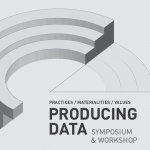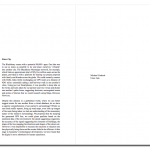CFP: Algorithmic Practices: Emergent interoperability in the everyday
Algorithmic Practices:
Emergent interoperability in the everyday
RGS-IBG 2015
Sponsored by:
The History and Philosophy of Geography Study Group
An ever-increasing proportion of the interactions that we have with digital platforms, apps and devices are mediated according to complex algorithms. Whether it be the real time analytics that draw us into playing a game on our phone, or tailored recommendations built from our historical searching and buying habits, we structure our daily lives in response to ‘performative infrastructures’ (Thrift, 2005: 224), most of them hidden deliberately by their makers.
Yet, in responding to the summons, the predictions, the recommendations, the help, the calculations that occur as platforms try to anticipate our next actions, we are learning how they work and don’t work. In our ad hoc assemblies of devices, apps and screens we short cut and re-make algorithms. For instance, in disaster response, ad hoc interoperability and agile response are creating incentives for ‘systems of systems’ that allow locally accomplished convergence of diverse information systems, with implications for data surge capacity as well as protection and privacy (Mendonça et al 2007).
Described as “a structured approach to real-time mixing and matching of diverse ICTs to support individuals and organizations in undertaking response”, emergent interoperability maybe becoming common place in less dramatic daily practices as individuals negotiate the range of algorithms that “react and reorganize themselves around the users” (Beer 2009).
This panel invites papers and presentations that provide insight into conditions and settings in which emergent operability and interoperability occurs within society.
Areas of interest:
– Dashboards, decongestion, security and the other promises of smart cities (Kitchin 2014)
– Wayfaring, wayfinding and other mobilities with map apps (Brighenti 2012)
– Changing forms of participation and collaboration through social media algorithms
– Responding to and attempting to manipulate predicted actions and recommendations
– The production of calculated publics (Gillespie 2014)
– Political contestation of algorithms
– Ad hoc systems
– Textures of communication in digital and traditional media
The deadline is Friday 6th February 2015.
Email speakers, title and abstract to eric.laurier@ed.ac.uk
References:
Beer, D. (2009) Power through the algorithm? Participatory web cultures and the technological unconscious. New Media & Society. London: SAGE. Vol 11(6): 985–1002.
Brighenti, A. M. (2012). New Media and Urban Motilities: A Territoriologic Point of View. Urban Studies, 49(2), 399–414.
Gillespie, T (2014) The Relevance of Algorithms, pp167-194 in Media Technologies, Essays on Communication, Materiality and Society ed. Tarleton Gillespie, Pablo Boczkowski, and Kirsten Foot. Cambridge, MA: MIT Press.
Kitchin, R. (2014). Thinking critically about and researching algorithms. The Programmable City Working Paper 5, Maynooth
Mendonça, D., Jefferson, T., & Harrald, J. (2007). Emergent Interoperability: Collaborative Adhocracies and Mix and Match Technologies in Emergency Management. Communications of the ACM, 50(3), 44-9.
Thrift, N. (2005) Knowing Capitalism. London: SAGE.
Related posts

NordiCHI Exploring incentivisation in design
Participants: Edinburgh: Chris Speed, Siobhan Magee, Debbie Maxwell, Mark Hartswood Birmingham: Juli

Design Informatics Seminars
This terms talks at the centre… Download poster here Research Seminars Semester 1 T-Room, Flo

“Is Your Marmite Watching You?”
Design Informatics took part in this year’s Edinburgh Fringe with the Beltane Public Engagemen

Producing Data: Practices, Materialities, Values
An interdisciplinary symposium 3rd – 4th September 2014, University of Edinburgh Hosted by: De

CoGet
So a brief summary and documentation of the CoGet workshop at Future Everything in March 2014. Acros

A Rhetorical Approach to Gameful Design
A Rhetorical Approach to Gameful Design Paul Coulton, ImaginationLancaster Thursday 1st May 4pm T-Ro

CoGet @ Future Everything
We are experimenting with our social logistics software CoGet at Future Everything in March: http://

Casting Time #2
Casting Time #2 Chris Speed, Margaret Stewart, Jules Rawlinson & Jane Macdonald 17th – 28t

Drawing With Satellites #3 book
Well that took a while! Following the workshop in February I finally got around to laying up the ima
